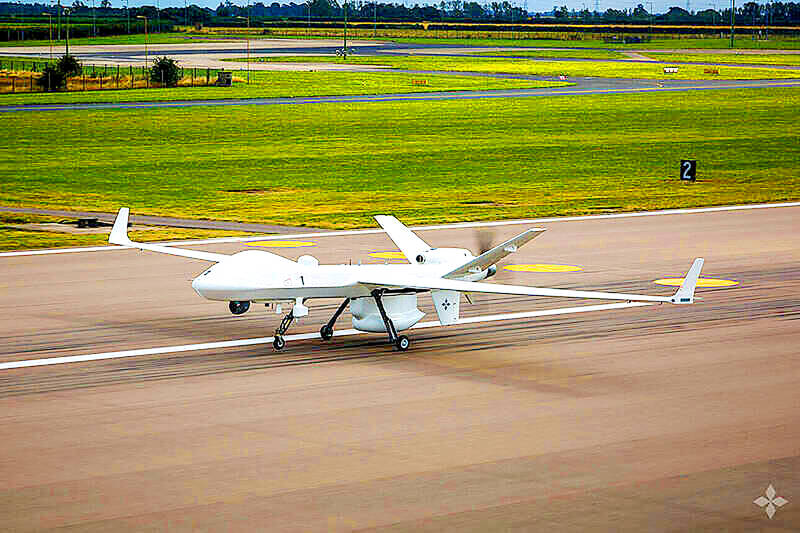Two of the four MQ-9B drones that the government procured from the US are to be delivered next year, a budget plan proposed by the Ministry of National Defense (MND) showed.
The procurement of the high-altitude reconnaissance drones is covered in a multiyear budget allocated to the air force from 2022 to 2029, which has amounted to about NT$21.72 billion (US$711.62 million). About NT$5 billion would be used to secure two of the MQ-9B drones next year, while the other two are to arrive in 2028.
The drones can be used to conduct surveillance and reconnaissance missions on maritime and land-based targets, the ministry said.

Photo: screen grab from General Atomics Aeronautical Systems Web site
Intelligence captured by the drones’ real-time reconnaissance imaging system can be instantly transmitted for analysis, it said.
The drones can also be used to support combat missions and deter enemies by disrupting their operations, it added.
The combined use of the MQ-9B and domestically developed Teng Yun 2 (騰雲二型, “Cloud Rider 2”), which are not yet in mass production, would enable the air force to cover high-altitude and low-altitude reconnaissance missions.
The fixed-wing MQ-9B, which is capable of continuous operation for 24 hours, can carry AGM-114 Hellfire missiles, GBU-39 small-diameter bombs and AIM-9 Sidewinder missiles to execute ground attack and aerial combat operations, the ministry said.
General Atomics, the manufacturer of the MQ-9B, said that the drones would be equipped with Sonobuoy Dispensing System pods for anti-submarine warfare, it said.
The US Indo-Pacific Command’s Pacific Fleet is to conduct an operational evaluation of the MQ-9B early next year, which would focus on the drone’s capabilities in maritime domain awareness, including its newly integrated anti-submarine warfare features, the California-based defense firm said in a news release.
Separately, the ministry said that the Armaments Bureau plans to allocate more than NT$1.01 billion from this year to 2028 to carry out the “Advanced Multi-Integration Development Plan for Uncrewed Vehicles.”
The initiative is part of a broader effort to enhance Taiwan’s indigenous defense capabilities by integrating cutting-edge technologies into uncrewed platforms.
The initiative involves several key technologies, including electro-optical lasers, composite materials, anti-jamming communications, navigation and positioning systems, uncrewed platforms and low Earth orbit (LEO) satellites, the defense budget plan showed.
The focus next year would be on detailed design and test planning for underwater reconnaissance electro-optical systems, development of a numerical simulation platform for LEO satellite-based positioning technology and establishing baseline manufacturing capabilities for medium-to-large continuous fiber composite materials.
In 2027 and 2028, the ministry plans to advance production of airframe structural composite materials and critical metal components, and execute a series of tests, the plan showed.
They include prototype ground testing of LEO satellite positioning systems, environmental testing of multimode airborne radar imaging modules, flight testing of uncrewed aerial vehicles and underwater field testing of the underwater reconnaissance system.

TRAFFIC SAFETY RULES: A positive result in a drug test would result in a two-year license suspension for the driver and vehicle, and a fine of up to NT$180,000 The Ministry of Transportation and Communications is to authorize police to conduct roadside saliva tests by the end of the year to deter people from driving while under the influence of narcotics, it said yesterday. The ministry last month unveiled a draft of amended regulations governing traffic safety rules and penalties, which included provisions empowering police to conduct mandatory saliva tests on drivers. While currently rules authorize police to use oral fluid testing kits for signs of drug use, they do not establish penalties for noncompliance or operating procedures for officers to follow, the ministry said. The proposed changes to the regulations require

The Executive Yuan yesterday announced that registration for a one-time universal NT$10,000 cash handout to help people in Taiwan survive US tariffs and inflation would start on Nov. 5, with payouts available as early as Nov. 12. Who is eligible for the handout? Registered Taiwanese nationals are eligible, including those born in Taiwan before April 30 next year with a birth certificate. Non-registered nationals with residence permits, foreign permanent residents and foreign spouses of Taiwanese citizens with residence permits also qualify for the handouts. For people who meet the eligibility requirements, but passed away between yesterday and April 30 next year, surviving family members

Taiwanese officials are courting podcasters and influencers aligned with US President Donald Trump as they grow more worried the US leader could undermine Taiwanese interests in talks with China, people familiar with the matter said. Trump has said Taiwan would likely be on the agenda when he is expected to meet Chinese President Xi Jinping (習近平) next week in a bid to resolve persistent trade tensions. China has asked the White House to officially declare it “opposes” Taiwanese independence, Bloomberg reported last month, a concession that would mark a major diplomatic win for Beijing. President William Lai (賴清德) and his top officials

The German city of Hamburg on Oct. 14 named a bridge “Kaohsiung-Brucke” after the Taiwanese city of Kaohsiung. The footbridge, formerly known as F566, is to the east of the Speicherstadt, the world’s largest warehouse district, and connects the Dar-es-Salaam-Platz to the Brooktorpromenade near the Port of Hamburg on the Elbe River. Timo Fischer, a Free Democratic Party member of the Hamburg-Mitte District Assembly, in May last year proposed the name change with support from members of the Social Democratic Party and the Christian Democratic Union. Kaohsiung and Hamburg in 1999 inked a sister city agreement, but despite more than a quarter-century of